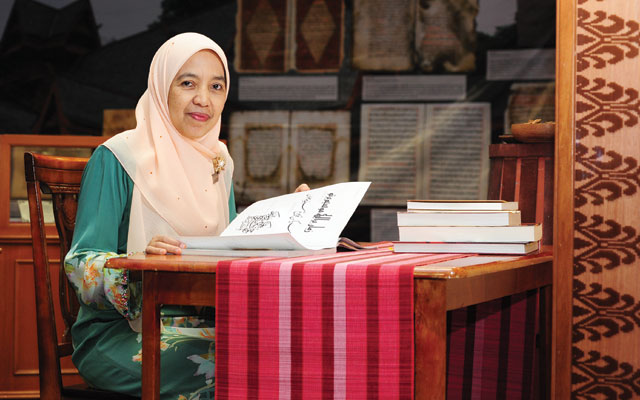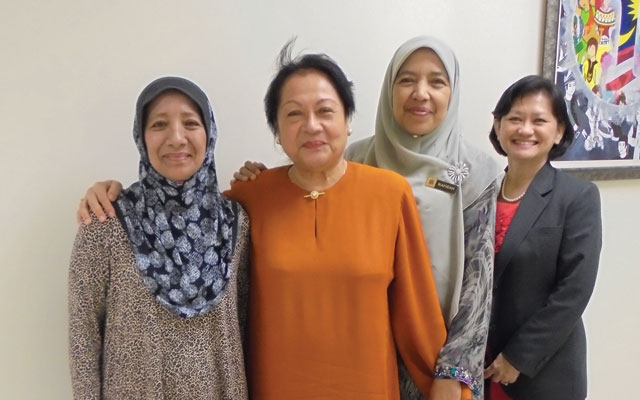Nafisah Ahmad, chairperson, national committee of the International Federation of Library Associations and Institutions World Library and Information Congress 2018 tells us a tale of perseverance
Why is it important to bring the International Federation of Library Associations and Institutions (IFLA) World Library and Information Congress (WLIC) to Malaysia?
WLIC is the most prestigious international conference platform for librarians in the world, and having this opportunity to host the congress in 2018 will allow Malaysian delegates to participate in an international conference, network with international participants and collaborate for the betterment of the industry.
It also provides the Librarians Association of Malaysia an opportunity to showcase what our libraries have to offer, and share best practices in the field of librarianship/ information management and communications technology with the rest of the world.
It will maximise Malaysia’s growth potential as an international education hub and first-world knowledge economy.
The eight-day congress is expected to attract delegates from more than 100 countries and generate RM44.4 million (US$9.9 million) in economic impact to the country.

What did you do differently in the third bid attempt?
At IFLA-WLIC 2015 in Cape Town, as part of our awareness drive for our local association and libraries, we took an exhibition booth to showcase activities and services of the Librarians Association of Malaysia and libraries in Malaysia. We had never attempted this in the past.
In the bid document, we also presented a supporting letter from the Ministry of Tourism and Culture Malaysia and the Malaysian Communications and Multimedia Commission to show that we had the strong backing from the government if we won the bid. We also had monetary support from the government.
Malaysia Convention & Exhibition Bureau (MyCEB) held our hands and supported us all the way, from helping with the bid document, to negotiating good rates with the host venue, Kuala Lumpur Convention Centre (KLCC), and liaising with different government agencies for off-site dining venues and tours.
We had only one month to prepare the bid document, but with the support of MyCEB, KLCC and members of our association, we managed to come up with a strong business case to hold the congress in Malaysia.
What do you think was the clincher?
We bid against Qatar for the 2018 congress. I think it was the site inspection that made the real difference.
After we were short-listed, four officials from IFLA came to Malaysia in June to assess our readiness for the congress. They saw we had a world-class, iconic venue (KLCC), with a wide choice of hotels within walking distance. They were also impressed with the different libraries we had selected for them to visit and which will be part of the programme should we win the bid.
They also saw improvements in our urban transport infrastructure, as they had done site inspections here when we bid for WLIC in 2010 and again in 2013.
The officials observed and commented that our committee members in the Librarians Association of Malaysia worked as a team and that we had sufficient manpower to ensure the successful execution of what was necessary.
We were also in a unique position due to my dual roles as president of the association as well as director-general of the National Library, which plays a leadership role among the libraries in Malaysia. Thus, I am able to get the cooperation and commitment of all the librarians and libraries in Malaysia.
Zulkefli Sharif, CEO of MyCEB, himself hosted a dinner for the officials in which he reinforced MyCEB’s support for the congress.
What preparations are needed?
We are in charge of getting a keynote speaker and two plenary speakers from Malaysia. We are also responsible for the opening and closing ceremonies and have to organise a cultural event. The rest of the programme will be organised by IFLA. As the local host, we will also have to market this congress overseas in order to hit our target of attracting 4,000 to 4,500 delegates.
Do you expect a record attendance from this region?
We are working very hard to ensure a record attendance from South-east Asia as this is a once in a lifetime opportunity (for many delegates in this region) to attend WLIC. They can save on airfare and accommodation at this congress, as compared to having to travel to Europe, the US or some other longhaul, developed destination to attend it.
To encourage them to attend the congress, we will provide travel grants for delegates from developing countries within South-east Asia, which will cover their accommodation and airfare. We are targeting 1,000 local delegates, 500 delegates from Asia-Pacific and a large number from North America and Europe.
What’s the programme like?
There will be more than 100 conference sessions and around 20 satellite meetings held before and after the main event. These are meetings for small groups of delegates with special interests in the IFLA sections and the venue will be hosted by local libraries.
All of these meetings, except for one, will be held within a three-hour flight time from Kuala Lumpur. The exception is a satellite meeting to be hosted by the Philippines Librarians Association.
The one-day satellite meeting planned for in Sabah will attempt to bring together issues relating to the theme of special needs groups, while the one in Sarawak will revolve around the theme of indigenous groups. The University of Malaya in Kuala Lumpur will hold a satellite meeting around the theme of Information and Communications Technology.
There will also be post-tours for delegates and their spouses to visit the many beautiful destinations in Malaysia.
What challenges do you foresee?
We have to work hard to promote the congress internationally in order to meet or surpass the attendance target. Next year, WLIC will be held in Poland and we need to send a big group from Malaysia to assist with promotions (of WLIC 2018). Getting commercial sponsors to commit is another challenge, especially in this current climate of global uncertainty and a soft economy. We stress to potential sponsors that exhibiting at WLIC is a wonderful opportunity to promote their products and services to an international audience.
What is next for you, after WLIC 2018?
I will retire from public service in 2019. However, I will continue to contribute to the profession through my involvement in the association.
Having been with the Librarians Association of Malaysia since 1999, what would you say is the biggest challenge for the association?
It is getting commitment from all librarians in Malaysia to support our programmes and to encourage librarians and non-professional library staff to become members. Attitude is something we have to deal with especially among young people. Before joining, many will consider what the association can do for them, rather than how they can contribute to make the association better.
How do you deal with this?
Giving members a platform to interact with their peers, both locally and internationally, such as through active participation and involvement in the organisation of this congress will motivate more young librarians and non-professional library staff to join our association.
On a national level, we organise conferences and seminars that are interactive as this will also encourage participation from members. We plan to introduce more courses for middle management. We are lobbying local public universities offering library information science programmes to encourage their undergraduates and postgraduates to become members of our association and gain credits that go towards their extra-curricular activities.
What more do you wish for your association?
While the Librarians Association of Malaysia is the voice of the association, I hope it will have a greater impact on society at large through our programmes which are meant to increase information literacy and media literacy among Malaysians including school children, those with special needs, indigenous communities and the homeless.
We will introduce activities and programmes in Malaysia in support of IFLA’s commitment which is in line with UN 2030 Sustainable Development Goals where access to information, universal literacy, safeguarding of cultural and natural heritage as well as access to Information and Communication Technologies are strongly represented.
A committed individual
Nafisah Ahmad, director-general, National Library of Malaysia has been actively involved in the development of libraries in Malaysia throughout her career. She has worked at the National Library of Malaysia for 30 years.

She was project director with the National Digital Library Project and a member of IFLA Cataloguing Section 2005-2006 and the Ubiquitous Library or u-Pustaka Project, among her many roles. She also sat on the national committee on cataloguing and classification from 1991 to 2007, and on the committee on national data dictionary for public sector from 2004 to 2012.
She has presented papers in local and international conferences.
Now, as the director-general of the National Library of Malaysia, she also sits on various committees which include Conference of Southeast Asian Librarians Executive Board Member, Conference of Directors of National Libraries and Conference of Directors of National Libraries Asia Oceania.
She is also currently the president of the Librarians Association of Malaysia and chairperson of the national committee of IFLA WLIC 2018.











